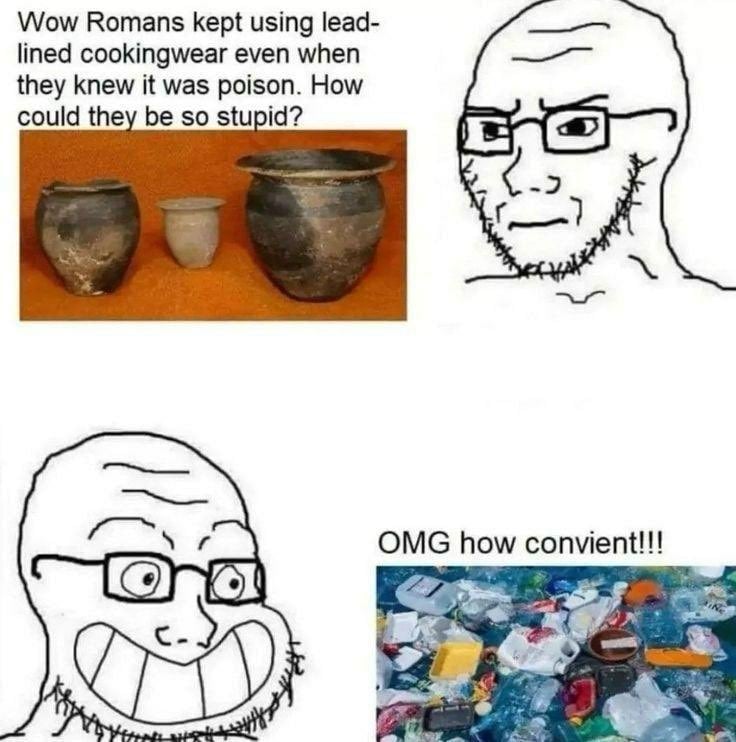this post was submitted on 22 Aug 2024
1192 points (97.8% liked)
memes
9806 readers
6 users here now
Community rules
1. Be civil
No trolling, bigotry or other insulting / annoying behaviour
2. No politics
This is non-politics community. For political memes please go to [email protected]
3. No recent reposts
Check for reposts when posting a meme, you can only repost after 1 month
4. No bots
No bots without the express approval of the mods or the admins
5. No Spam/Ads
No advertisements or spam. This is an instance rule and the only way to live.
Sister communities
- [email protected] : Star Trek memes, chat and shitposts
- [email protected] : Lemmy Shitposts, anything and everything goes.
- [email protected] : Linux themed memes
- [email protected] : for those who love comic stories.
founded 1 year ago
MODERATORS
you are viewing a single comment's thread
view the rest of the comments
view the rest of the comments

You say this like we don't still have kitchenware with lead (or other nasties like cadmium) in them, often for purely aesthetic reasons. Most of these are discontinued products still in circulation, but some are still being produced (in theory they're "safe for use" because the heavy metals are sealed behind something nontoxic, but scratches and chips may expose them).
AESTHETIC reasons?? girl lead poisoning isn't worth a pretty pot.
Everyone makes fun of California's prop 65 warnings, but this is exactly the situation they exist for: knowing which colorful plate sets to avoid at Crate & Barrel.
The problem is it doesn't have a minimum quantify before reporting is required, so 1 pay per trillion of any of 10,000 different substances triggers the warning, so there isn't anything that doesn't require the warning.
The standard essentially requires an unachievable level purity along every step of the manufacturing and distribution process in order to NOT have the label.
The result is over-labeling, which results in products that we should actually be concerned about sneaking into our homes because we ignore warning labels.
Interesting.
Wouldn't it have been better to have the manufacturer state the amounts? That way, you just need to read the fine print. Like one does for food products.
Ok but can we make fun of the fact that they aren’t required to specify which material? Like let me decide if it carcinogenic enough
But it doesn't work when every manufacturer puts those stickers on literally everything just in case.
Would you be talking about plates, spoons and such, when saying, "kitchenware"?
Because I don't see something like a wok having a heavy metal being sealed behind something else, since the surface needs to be some metal anyway and I don't know of any transparent metals.
On another note, I recently got gifted a melamine crockery set, by the company. And since this is a product that could easily be problematic if the manufacturing process were not perfect (and I don't see the company not cheaping out), I only use the stuff for keeping peels and other waste, before throwing it out.
Anti Commercial-AI license